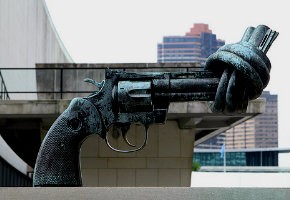Gun control in sight: Faith groups seize political moment

Days after the December mass shooting in Newtown, Connecticut, Faiths United to Prevent Gun Violence convened a press conference. The national coalition petitioned Congress to demand background checks for all gun purchases, ban high-capacity weapons and magazines and make gun trafficking a federal crime. Representatives of 47 religious organizations signed on—not just liberals but also evangelical leaders such as Samuel Rodriguez and T. D. Jakes.
The group was ready to respond to the tragedy because ending gun violence has long been a cause among faith-based activists. Some mainline denominations have been working on the issue since the 1980s. The National Council of Churches worked to pass the assault weapons ban of 1994, which has since expired. According to Washington office director Cassandra Carmichael, since Newtown the NCC—at the request of the Connecticut Council of Churches—has provided pertinent worship and pastoral resources. Carmichael notes that the group is also doing coordinating work to “make sure the moral message doesn’t get lost.”
In fall 2010, activist Vincent DeMarco, working under the auspices of the Brady Campaign, began to pull together a broad faith-based coalition. The project, modeled on DeMarco’s successful antitobacco work, eventually became Faiths United. Years of partnerships through the NCC and elsewhere paid off: DeMarco’s coalition started with 17 charter members and quickly expanded.





